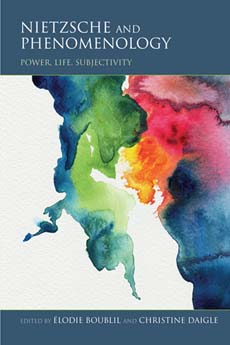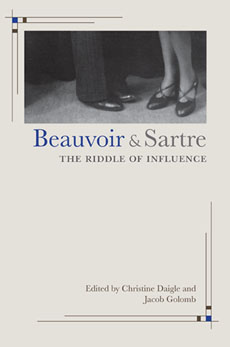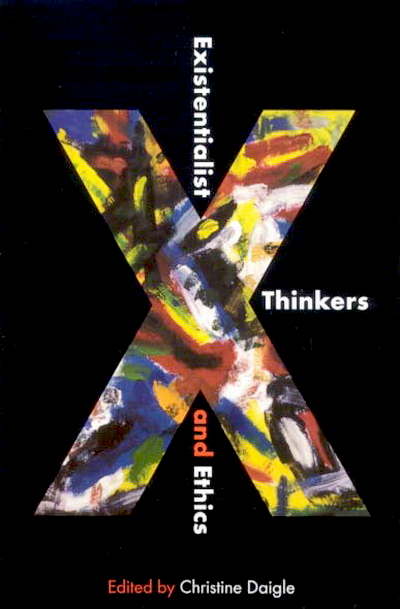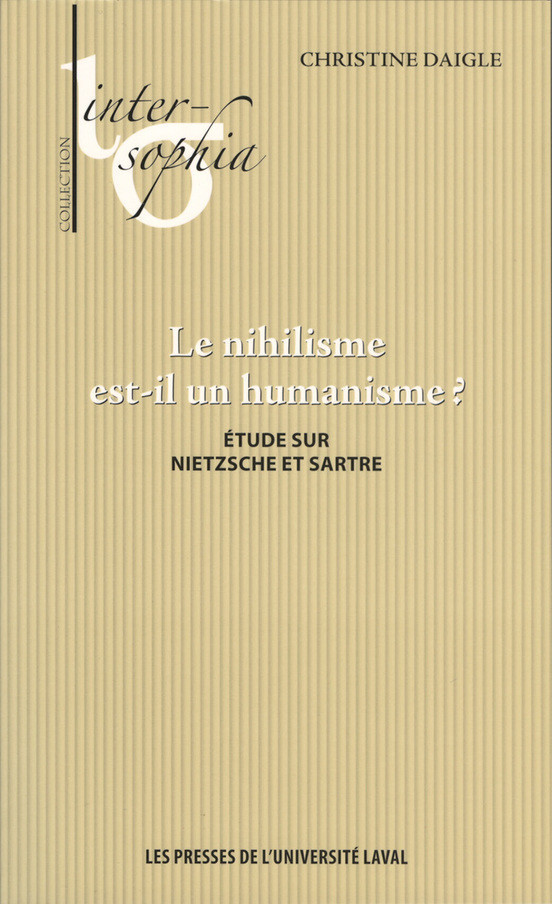
Media
CBC, August 6, 2014Radio/Podcast
URL: http://www.cbc.ca/radio/ideas/friedrich-nietzsche-1.2914034
A documentary on German philosopher Friedrich Nietzsche with 3 experts.

Nietzsche and Phenomenology. Power, Life, Subjectivity
by Élodie Boublil and Christine Daigle (eds.)
Indiana University Press
June 19, 2013
978-0-253-00932-6
What are the challenges that Nietzsche's philosophy poses for contemporary phenomenology? Elodie Boublil, Christine Daigle, and an international group of scholars take Nietzsche in new directions and shed light on the sources of phenomenological method in Nietzsche, echoes and influences of Nietzsche within modern phenomenology, and connections between Nietzsche, phenomenology, and ethics. Nietzsche and Phenomenology offers a historical and systematic reconsideration of the scope of Nietzsche’s thought.
Routledge
October 16, 2009
9780415435659
A critical figure in twentieth-century literature and philosophy, Jean-Paul Sartre changed the course of critical thought, and claimed a new, important role for the intellectual.
Christine Daigle sets Sartre’s thought in context, and considers a number of key ideas in detail, charting their impact and continuing influence, including:
Sartre’s theories of consciousness, being and freedom as outlined in Being and Nothingness and other texts
the ethics of authenticity and absolute responsibility
concrete relations, sexual relationships and gender difference, focusing on the significance of the alienating look of the Other
the social and political role of the author
the legacy of Sartre’s theories and their relationship to structuralism and philosophy of mind.
Introducing both literary and philosophical texts by Sartre, this volume makes Sartre’s ideas newly accessible to students of literary and cultural studies as well as to students of continental philosophy and French.
Indiana University Press
January 19, 2009
978-0-253-22037-0
While many scholars consider Simone de Beauvoir an important philosopher in her own right, thorny issues of mutual influence between her thought and that of Jean-Paul Sartre still have not been settled definitively. Some continue to believe Beauvoir's own claim that Sartre was the philosopher and she was the follower even though their relationship was far more complex than this proposition suggests. Christine Daigle, Jacob Golomb, and an international group of scholars explore the philosophical and literary relationship between Beauvoir and Sartre in this penetrating volume. Did each elaborate a philosophy of his or her own? Did they share a single philosophy? Did the ideas of each have an impact on the other? How did influences develop and what was their nature? Who influenced whom most of all? A crisscrossed picture of mutual intricacies and significant differences emerges from the skillful and sophisticated exchange that takes place here.
McGill/Queen's University Press
October 3, 2006
9780773531383
Twentieth-century existential thinkers, critical of traditional, overly rationalistic approaches to ethics, sought to provide a better account of what it means to be human in the world. They articulated ethical views that respected the individual yet were fundamentally concerned with the Other and the ethical value of an authentic life. Their philosophy has often been dismissed as unsuccessful. Through examination of the thought of eight key figures in existentialism - Kierkegaard, Nietzsche, Heidegger, Arendt, Camus, Sartre, Beauvoir, and Merleau-Ponty - this collection demonstrates that such dismissals are unfounded. Contributors tackle the difficulties raised by an existentialist ethics and show how each thinker successfully elaborated an ethics that provides a viable alternative to traditional ethical views. Contributors include Glenn Braddock (Skidmore College), Christine Daigle (Brock University), Dominic Desroches (Collège Rosemont), David W. Goldberg (Westminster College), Philip Knee (University of Ottawa), Todd Lavin (Clarion University), Kym MacLaren (North Arizona University), and Stephen Schulman (Elon University).
Presses de l'Université Laval
December 21, 2005
2-7637-8205-1
Dans son essai, Christine Daigle établit en quoi les philosophies de Nietzsche et Sartre convergent ou divergent en ce qui a trait à la problématique du nihilisme, à la quête de sens et à l'éthique. Elle examine leur solution respective au mal moderne créé par le nihilisme, soit le manque de fondement pour les valeurs. Cette solution passe par une réponse optimiste à la question du sens de l'existence qui met l'accent sur le rôle de l'humain comme créateur de sens, et ce, chez Nietzsche comme chez Sartre. Sur ces bases, Nietzsche et Sartre proposent une éthique existentialiste humaniste qui promeut l'épanouissement authentique de l'individu. Si chacun élabore cette éthique à sa façon, Christine Daigle démontre que l'on peut soutenir que Nietzsche et Sartre sont, du point de vue éthique, de proches parents.
Biography
Daigle obtained her PhD from Université de Montréal in 2001. She has been working at Brock since 2003.
Recognition/Reconnaissance
Chancellor's Chair for Research Excellence | Professional
Research chair awarded to active scholars who have demonstrated excellence and who will continue to make significant contributions to the advancement of their field.
Research Grants
Posthumanism Research Network
Organization: SSHRCDate: April 1, 2017
Grant amount: 197,338
Details:
A SSHRC Partnership Development grant to support the establishment and development of the Posthumanism Research Network to facilitate the exchange and cross-pollination of ideas among researchers in Canada and abroad working on posthumanism.




